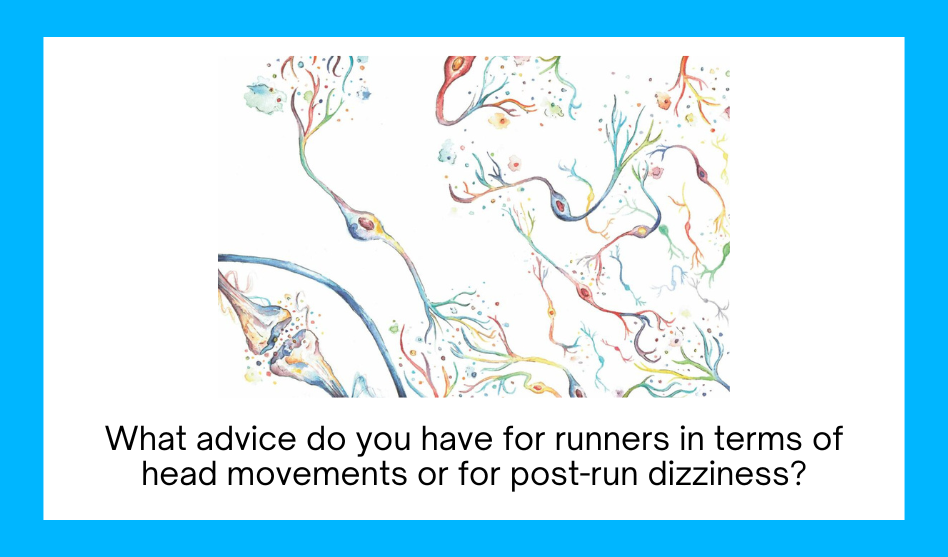Question from a member of our community:
Any specific advice for runners in terms of head movements and also dizziness that sometimes comes at the end of a run?
So my first response to this question is it’s not really about running or any activity. Every single person will feel what they feel in any given moment and they’ll have to find a way to acknowledge and meet that and be with that and be real about it. Because if we’re falling into this trap of dismissing and pushing through and minimizing, we’re really just not attending to the body. We’re not being responsive and we’re not taking care of ourselves to the level that the body’s asking for. The body’s bringing these sensations up and it’s saying, “Hey, tune in. Attune to me. Listen to me. I need help regulating. I need your help.” So it doesn’t really matter whether you are running a flight of stairs, running a marathon, or even if you are practicing piano and you’re a concert pianist and you’re starting to get symptoms because you’re doing really long practice sessions and the body’s beginning to disregulate.
So it’s not about what you’re doing. I think it’s more about what you’re sensing and feeling and how you’re responding to that, how you’re supporting it. So my advice with regards to head movements and dizziness would be something along the lines of keep your head movements as natural as possible. Anytime we’re rigid or stiff, it just leads to so many other problems, aside from maladaptive dizziness strategies and potentially creating more of a vicious cycle, it can also lead to postural issues, neck, headache, migraine, you name it. So keeping your head movements and your shoulder movements and your neck positions as loose and relaxed and natural as possible.
And what I would say is when you’re out and about, look at what you want to look at, stabilize your vision, find things that please you. So because we’ve got this example of running, if we’re out on a run, rather than being freaked out and worried about dizziness, actually look for things on your run that bring you pleasure. Find ways to relax into the run, to soften your footfall, and to let your eyes naturally move. If you see a bird or you see a car or you see someone with a really nice jacket you like, allow yourself to have that natural flow and playfulness in your posture. So that would be number one is keep your head and neck movements as natural as possible and follow pleasure. Allow your gaze to go where it wants to go for the sake of it.
And the second piece would be anytime that you’re feeling dizziness, whether it’s after a run or after a piano practice or after love making, after a good giggle, it could just be that the nervous system has dysregulated a little bit, or it could be that there is a bit of a cluster and the resources within the brain and the body are very busy, you can think of it as traffic jams, and so there is a bit of temporary dizziness as the body is recalibrating and finding its equilibrium. It’s nothing to worry about. You don’t need to change it. You don’t need to rush it. I would probably move you in the direction of the module three home exercises. And that gives you some good tips and tools on how to be off balanced, be imbalanced, and re-find that steadiness and how to do that in a really structured, gentle, safe way, and make a practice of learning how to lean in toward dizziness and imbalance, but then also how to recenter and re-find balance.

